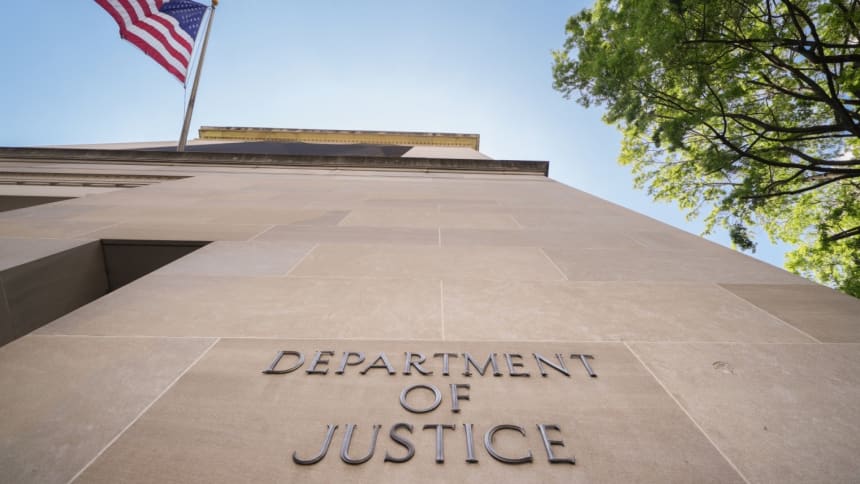The Dictatorship
Trump and Bukele must think Americans are either ignorant or incredibly gullible

Late Thursday, a unanimous Supreme Court ordered the Trump administration to “facilitate” the return of Kilmar Abrego Garciathe Salvadoran citizen who was in the United States legally but illegally rendered to a Salvadoran prison over what the administration admits was an “administrative error.” Now the same administration that claims the U.S. can take over Greenland and Canada is pretending it can’t dictate policy to another country. “If they want to return him, we would facilitate it, meaning provide a plane,” Attorney General Pam Bondi said Monday during an Oval Office meeting between Trump and Salvadoran President Nayib Bukele. “That’s up for El Salvador if they want to return him,” she argued.
Bukele, for his part, completed the shell game: “I don’t have the power to return him to the United States,” he insisted. But the U.S. can do far more than “provide a plane” to “facilitate” Abrego Garcia’s return. When the White House asserts it is out of ideas for how to bring him back, don’t believe it.
The White House has deployed a wide range of tactics to secure the compliance of those over which it has little direct or legitimate authority.
The Trump administration has attempted — not very successfully — to use on-again-off-again tariffs to try to bend foreign governments to its will. It has attacked law firms to punish them for past perceived slights of the president, to get them to refrain from suing the administration in the future and to force them to serve the policy goals of the administration. It has slashed billions of dollars in contracts with and grants to America’s most prestigious research universities for not serving the Trump administration’s interests.
In other words, the White House has deployed a wide range of tactics — mostly on dubious legal grounds — to secure the compliance of those over which it has little direct or legitimate authority. As the Trump administration suddenly draws a blank on how it could pressure the Salvadoran government to return Abrego Garcia, then, no one should take such claims seriously.
If the administration’s position is that once anyone is outside U.S. territory and custody, courts cannot order their return — no matter how illegal or unconstitutional that rendition — what would stop the federal government from sending anyone, citizen and noncitizen alike, to a prison camp in some other part of the world without recourse? To put it bluntly: nothing. Under this logic, if the administration could do this to this individual, literally no one is safe, provided they are whisked out of U.S. government custody and control.
With its ruling Thursday, the Supreme Court rejected this sort of race-to-the-border logic. Now that the Supreme Court has stepped in and ordered Abrego Garcia’s return, it is up to the Trump administration to comply. But the court’s unanimous order also leaves the White House a little wiggle room. The court found that one aspect of the lower court’s directive, that the administration “effectuate” Abrego Garcia’s return, was “unclear, and may exceed the District Court’s authority.” It directed the lower court to “clarify” that directive, “with due regard for the deference owed to the Executive Branch in the conduct of foreign affairs.” At the same time, it also found that the administration “should be prepared to share what it can concerning the steps it has taken and the prospect of further steps.”
If the administration, and the trial court, are looking for some guidance on what steps the government could take to “effectuate” Abrego Garcia’s return, they need not look past the free-wheeling actions of the administration over the last month for some tactics for achieving that goal. The playbook from which it is drawing its current tactics is full of ways to bring Abrego Garcia home. And it won’t take much.
The U.S. government could pressure the Salvadoran government in any number of ways, like it has other nations and institutions.
The U.S. pays El Salvador to detain deported migrants like Abrego Garcia. The administration could threaten to cut those funds or suspend future transfers unless he is returned. It could increase tariffs. It could assert the power to increase tariffs on other countries that do business with El Salvador. It could cut foreign aid to the country. Indeed, the U.S. government could pressure the Salvadoran government in any number of ways, like it has other nations and institutions. If it even hinted that it might consider any of these tactics, Abrego Garcia would be on the next flight home. That it refused to even try speaks volumes.
In the long run, as at least some members of the court recognize, any judicial ruling short of ordering the Trump administration to secure the return of Abrego Garcia will simply encourage the federal government to deport individuals — noncitizens and citizens alike — and place them in the hands of a foreign power as quickly as possible, putting them out of the supposed reach of the law and the Constitution. In a statement appended to the court’s order, Justices Sonia Sotomayor, Elena Kagan and Ketanji Brown Jackson warned of this possibility: “The Government’s argument, moreover, implies that it could deport and incarcerate any person, including U. S. citizens, without legal consequence, so long as it does so before a court can intervene.”
For now, the Supreme Court did not say exactly how the Trump administration should comply with its orders, but the justices at least did what they had to do in this setting: declare these actions illegal. If the Trump administration does not move to bring Abrego Garcia home, it will only raise the stakes. The courts should not tolerate the White House’s feigned powerlessness, especially when it has tried to stretch the bounds of its own power in so many other contexts.
Ray Brescia
Ray Brescia is a professor of law at Albany Law School and author of the forthcoming book “The Private Is Political: Identity and Democracy in the Age of Surveillance Capitalism.”
The Dictatorship
Rubio says ‘no reason’ to doubt Navalny was killed by dart frog poison
ByDavid Rohde
Secretary of State Marco Rubio says there is “no reason” to doubt a new report by five European nations that Russian opposition leader Alexei Navalny was killed in a Russian government prison with poison found in Latin American dart frogs.
A fatal toxin not found naturally in Russia — epibatidine — was “conclusively” discovered in samples of Navalny’s body by a joint investigation conducted by Germany, France, Britain, the Netherlands and Sweden, according to a joint statement by the nations on Saturday.
The toxin is only known to exist in poison dart frogs in Central and South America. One species, the phantasmal poison frog, contains a chemical that is 200 times more potent than morphine.
“It’s a troubling report,” Rubio told reporters at a news conference during a visit to Slovakia on Sunday. “We don’t have any reason to question it.”

It was not clear why the United States did not participate in the investigation of Navalny’s death. But the finding comes amid rising support in the Senate for a bill that would impose sweeping new sanctions against the government of Vladimir Putin, which has been opposed by the Trump administration.
Sen. Jeanne Shaheen, D-N.H., the top Democrat on the Senate Foreign Relations Committee, noted on the closing day of the Munich Security Conference, where Rubio received a standing ovationthat 84 out of 100 senators have signed on to co-sponsor the bill authored by Sen. Lindsey Graham, R-S.C.
“I don’t understand the reluctance to go after Vladimir Putin and what Russia is doing in Ukraine,” Shaheen told a group of reporters. “The failure by the United States to act has extended this war.”
Russian officials have repeatedly denied playing any role in the death of Navalny two years ago in a government-run penal colony in the Arctic. They called the new European report “a Western propaganda hoax,” according to Russia’s state news agency.

The report comes as U.S. envoy Steve Witkoff and Jared Kusher, President Donald Trump’s son-in-law, are expected to meet with both Russian and Iranian officials on Tuesday in Geneva. The goal of the Russia talks is to reach a peace settlement in Ukraine by a June deadline the administration has set. (Witkoff and Kushner are also set to join a second round of nuclear talks with Iranian officials in Geneva on the same day.)
Critics of Trump, who promised to end the war days after returning to office, say Russia has not been seriously negotiating and is simply playing for time so it can gain ground on the battlefield. Democrats have also expressed concerns over reports that Witkoff has been negotiating business deals during peace talks with Kirill Dmitriev, a former Wall Street banker who runs Russia’s sovereign wealth fund.
Last week, Ukrainian President Volodymyr Zelenskyy said that Dmitriev pitched $12 trillion in bilateral economic agreements with the U.S. It is unclear how such large deals could be achieved. The $12 trillion figure is about four times the size of Russia’s 2025 gross domestic product.
A European diplomat whose country has negotiated with Russia in the past told MS NOW that Moscow has repeatedly made such investment offers. But the business entities end up being largely Russian controlled. “They lure you in,” said the diplomat, who was granted anonymity to speak candidly.
Shaheen expressed skepticism as well.
“I’m concerned about all things Russian in this administration,” Shaheen said. “I’m not a conspiracy theorist. But I’m beginning to become one with respect to Putin and President Trump.”

David Rohde
David Rohde is the senior national security reporter for MS NOW. Previously he was the senior executive editor for national security and law for NBC News.
The Dictatorship
FBI links glove found near Nancy Guthrie’s home to suspect on video
A glove with DNA found near 84-year-old missing Nancy Guthrie’s home appears to match those worn by a masked person caught on surveillance footage, the FBI said Sunday.
“The FBI received preliminary results yesterday on 2/14 and are awaiting further testing,” the bureau said in a statement. “This process typically takes 24 hours from when the FBI receives DNA.”
The FBI said investigators collected “approximately 16 gloves in various areas near” Guthrie’s house in Tucson, Arizonawhere she was last seen on Jan. 31. Most of those gloves were “searchers’s gloves that they discarded in various areas when they searched the vicinity” but the glove with the “DNA profile recovered is different and appears to match the gloves of the subject in the surveillance video,” the FBI said.
“What we have is a lead here. The glove retrieved would need to have the victim’s DNA or some other forensic material to tie it to the home,” a law-enforcement source familiar with the investigation cautioned. “It must be connected to the home and victim. That would make the glove actual evidence, at this point it’s a lead. A good lead.”

The FBI said said the glove was found in a field approximately two miles from Guthrie’s house. The glove resembles the one on the hand of a person who was captured on porch camera video footage at the home of NBC “Today Show” host Savannah Guthrie’s mother the night she went missing.
The agency said it is awaiting quality control and official confirmation before putting the individual’s profile into the bureau’s national database, which could take up to 24 hours.
The FBI has described the man captured in photographs and on video as approximately 5’9”-5’10” with an average build. In addition to gloves, he was also seen wearing a ski mask and a black, 25-liter “Ozark Trail Hiker Pack” backpack. The agency on Thursday increased its reward for any information leading to an arrest and conviction of anyone involved in Guthrie’s disappearance to $100,000.
Guthrie was reported missing by her family on Feb. 1. Sheriff’s deputies also found blood on the front porch that was later confirmed to belong to the network host’s mother. Guthrie’s children, including Savannah, have posted several videos pleading for their mother’s release, agreeing to pay any ransom demanded and asking for help from the public.
Alex Tabet, Marc Santia and Ken Dilanian contributed to this report.
Erum Salam is a breaking news reporter and producer for MS NOW. She previously was a breaking news reporter for The Guardian.
The Dictatorship
Lawmakers slam Justice Department’s defense of Epstein files redactions
Rep. Thomas Massie, R-Ky., co-author of the Epstein Files Transparency Acton Sunday slammed what he called Donald Trump’s “Epstein administration” for not fulfilling its legal obligation to release all government documents related to the late convicted sex offender.
Massie cited a Justice Department letter sent to Congress on Saturday defending its redactions made to the newly released final batch of Epstein documents. Appearing on ABC’s “This Week” show, the GOP congressman noted the DOJ letter, signed by Attorney General Pam Bondi and Deputy Attorney General Todd Blanche, cited “deliberative-process privilege” as a reason for withholding certain records.
“The privileges that applied to the withheld records were deliberative-process privilege, work-product privilege, and attorney-client privilege.,” the Feb. 14 DOJ letter said. The letter listed the names of more than 300 people, many of whom had no direct dealings with Epstein and have long been dead, including Marilyn Monroe, Elvis Presley and Ronald Reagan.
Other names include President Donald Trump, former Presidents Barack Obama and Bill Clinton, Treasury Secretary Howard Lutnick — who was grilled before Congress last week over his association with Epstein — Jeff Bezos and Peter Thiel. None of the people listed have been accused of criminal wrongdoing with regard to Epstein’s actions.
Rep. Ro Khanna, the California Democrat who co-authored the Epstein bill, also criticized the DOJ letter regarding its redactions.

“The DOJ is once again purposefully muddying the waters on who was a predator and who was mentioned in an email,” Khanna said on X. “To have Janis Joplin, who died when Epstein was 17, in the same list as Larry Nassar, who went to prison for the sexual abuse of hundreds of young women and child pornography, with no clarification of how either was mentioned in the files is absurd.” (The Justice Department announced in December that a letter released in a tranche of Epstein files purportedly from Epstein to Nassar, the convicted Olympic gymnastics coach, was a fake.)
Massie objected to the DOJ’s claim of privilege in withholding certain Epstein documents because, he said, the Justice Department “must release internal memos and notes and emails” related to investigative and prosecutorial decisions regarding the Epstein matter.
“It’s important they follow that because then we could find out why they didn’t prosecute Leslie Wexner,” he told ABC’s Martha Raddatz. A legal representative for Wexner said in a statement that the assistant U.S. Attorney in charge of the Epstein investigation “stated at the time that Mr. Wexner was neither a co-conspirator nor target in any respect” and that “Mr. Wexner cooperated fully by providing background information on Epstein and was never contacted again.”
Massie accused the Justice Department of taking down documents before members of Congress were able to review them in their unredacted forms. “We want to be able to look at all these files,” he said. Lawmakers have also been subject to apparent surveillance while reviewing Epstein documents in a private room at the Justice Department.
Rep. Robert Garcia, D-Calif., ranking member of the House Oversight Committee, echoed calls for answers about who was involved in the trafficking of girls and women besides convicted Epstein co-conspirator Ghislaine Maxwell.

“We have questions for President Trump, and I think the broader issue here is why wasn’t this investigated when these accusations and these stories actually were heard by the FBI years ago?” Garcia said in a Sunday interview with CBS’s “Face the Nation” show. “Where was the investigation? Where was the DOJ? And this, by the way, is an issue not just in Republican administrations, but also ones led by Democrats. We have to get answers.”
The Justice Department, in its letter to the Republican chairmen and ranking Democrats of House and Senate Judiciary Committees, said no records were withheld or redacted “on the basis of embarrassment, reputational harm, or political sensitivity, including to any government official, public figure, or foreign dignitary.”
Several of those listed have faced backlashincluding ex-prince Andrew Mountbatten-Windsor, who was stripped of his royal titlesevicted from Windsor Castle and faces a potential investigation in the U.K.
The DOJ said the lengthy list of high-profile names included in its letter includes “all government officials and politically exposed persons.” But the letter does not differentiate between people mentioned in news stories who likely had little or no connection to Epstein and those who were shown to have communicated with Epstein, Maxwell and other associates.
Massie, who is facing a primary opponent endorsed by Trump, said the president is “still with the Epstein class. This is the Epstein administration and they’re attacking me for trying to get these files released.”
Erum Salam is a breaking news reporter and producer for MS NOW. She previously was a breaking news reporter for The Guardian.
-

 The Dictatorship1 year ago
The Dictatorship1 year agoLuigi Mangione acknowledges public support in first official statement since arrest
-

 Politics12 months ago
Politics12 months agoFormer ‘Squad’ members launching ‘Bowman and Bush’ YouTube show
-

 The Dictatorship5 months ago
The Dictatorship5 months agoMike Johnson sums up the GOP’s arrogant position on military occupation with two words
-

 Politics12 months ago
Politics12 months agoBlue Light News’s Editorial Director Ryan Hutchins speaks at Blue Light News’s 2025 Governors Summit
-

 Politics12 months ago
Politics12 months agoFormer Kentucky AG Daniel Cameron launches Senate bid
-

 The Dictatorship12 months ago
The Dictatorship12 months agoPete Hegseth’s tenure at the Pentagon goes from bad to worse
-
Uncategorized1 year ago
Bob Good to step down as Freedom Caucus chair this week
-

 Politics10 months ago
Politics10 months agoDemocrat challenging Joni Ernst: I want to ‘tear down’ party, ‘build it back up’





